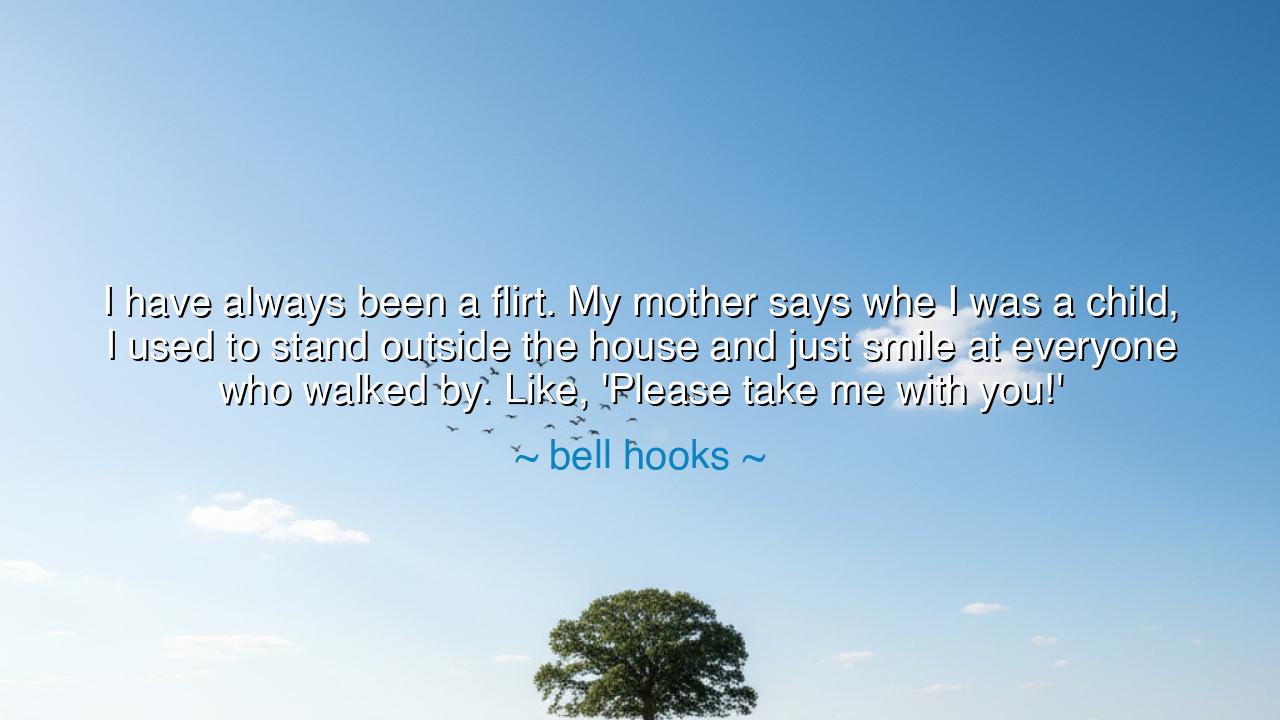
I have always been a flirt. My mother says whe I was a child, I
I have always been a flirt. My mother says whe I was a child, I used to stand outside the house and just smile at everyone who walked by. Like, 'Please take me with you!'






Hear the playful yet profound confession of bell hooks, the great thinker and teacher of love: “I have always been a flirt. My mother says when I was a child, I used to stand outside the house and just smile at everyone who walked by. Like, ‘Please take me with you!’” Though light in tone, these words reveal more than jest—they unveil the early spirit of one destined to give herself to the world. For within the image of a child standing by the door, offering her smile to strangers, lies a truth about openness, longing, and the radical courage of love.
To be a flirt, as hooks declares, is not merely to seek affection or attention. It is to court connection, to extend the self outward with courage and delight. From childhood, her instinct was to meet the world not with guardedness, but with a smile—a simple, vulnerable invitation that says: “See me, know me, carry me with you.” Such an act may seem small, but in it lies the seed of her later philosophy: that love, community, and connection begin with the willingness to open oneself to others.
The ancients, too, spoke of this. Plato, in his dialogues, declared that the soul is drawn ever outward, seeking communion with what is beyond itself. The mystics of every age have taught that to live fully is to dissolve the walls between self and other. In hooks’s childlike smile, we see this same principle: the yearning to belong not just to a family, but to humanity itself. What she offered as a child with innocence, she later gave as a scholar—with words, with teachings, with radical love.
Consider, too, the way this memory is told through the voice of her mother. Parents often see in their children the signs of their destiny before the child herself understands. The mother recalls the young girl’s gestures, her eager smiles toward strangers, as if to say: this child was always meant to step beyond the threshold of the home and into the wider world. And so it was. bell hooks lived her life not confined within walls, but in the public square, speaking to all who would listen, offering herself as she once offered her smile.
History gives us other echoes. Think of St. Francis of Assisi, who as a youth was known for his charm and playfulness, always surrounded by laughter, yet who transformed that same openness into a lifelong ministry of compassion. What began as delight in the world became, in time, a gift given back to the world. So it is with hooks: the child’s smile, once playful, matured into the philosopher’s call to dismantle oppression with the power of love.
The deeper meaning here is that joy and connection are not trivial—they are the foundations of transformation. The flirt is not only one who seeks love, but one who dares to admit they need others, who offers a piece of themselves freely. In a world that teaches us to be guarded, hooks reminds us that to live authentically is to risk openness, to smile at strangers, to desire connection even when it makes us vulnerable.
Therefore, O listener, take this lesson into your own days: do not withhold your smile, nor your openness, nor your yearning for connection. Remember that the longing you feel to be “taken with” others is not weakness, but the essence of humanity. In a society fractured by isolation and suspicion, your willingness to be seen, to connect, to reach outward, is itself an act of resistance and renewal.
Thus, bell hooks’s words, cloaked in humor, carry the wisdom of the ancients: the child who smiled at passersby was already practicing the deepest kind of philosophy—the philosophy of love. Be as she was: open, vulnerable, courageous. Let your smile be not only an expression of joy, but an invitation to transform the world through the radical act of connection.






AAdministratorAdministrator
Welcome, honored guests. Please leave a comment, we will respond soon